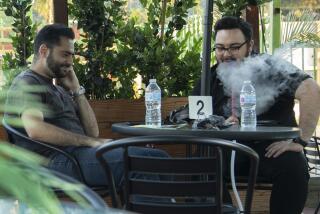Smoking Law Cuts Bar Sales 26%, Trade Group Says
- Share via
Sales are down an average of 26% statewide and complaints are up in California bars since a smoking ban went into effect Jan. 1, according to a study released Thursday by the American Beverage Institute.
In the study, conducted for the Washington-based association, 60% of 300 establishments questioned in a telephone survey reported a decrease in business.
The report found that half of the bar owners said they had experienced increased customer complaints. About one-fourth of those surveyed said they are smoker-friendly, allowing patrons to light up despite the state law.
“This is not benign legislation,” said John Doyle, director of public affairs for the institute, a year-old trade association representing and funded by thousands of restaurants, bars and chains, including Hard Rock Cafe, El Torito and the Marriott Corp.
“Individual establishments should be able to set their own smoking policies. This is conclusive evidence the California smoking ban is an experiment that has failed,” Doyle said.
But Stanton A. Glantz, a professor at UC San Francisco medical school, called the study “a standard drill that the tobacco industry routinely does,” adding that “every time a law like this is passed, they always produce a report like this.”
Cynthia Hallett, policy specialist for the Berkeley-based Americans for Nonsmokers’ Rights, said the study “finds what they are looking for.” Hallett questioned the study’s validity. “They are not looking at hard data,” such as sales tax information, she said.
Richard Berman, general counsel for the American Beverage Institute, said that when bar owners were asked if their business had been affected since the ban started, he assumed they were comparing last year’s receipts to those from this year.
No tobacco industry support was used to fund the study, which cost $50,000, Berman said.
Calls were placed to 7,216 establishment and 300 agreed to take part, the institute said. The interviews were conducted March 3 to 6. There is an approximate margin of error of plus or minus 5 percentage points.
More to Read
Sign up for Essential California
The most important California stories and recommendations in your inbox every morning.
You may occasionally receive promotional content from the Los Angeles Times.










